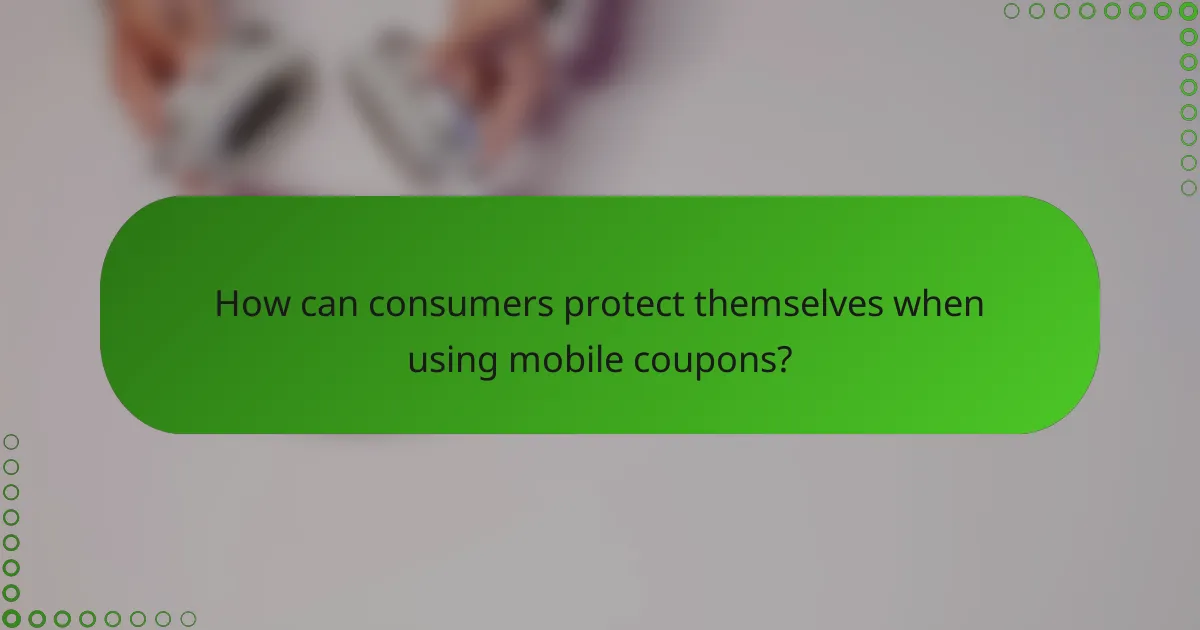Mobile coupons offer convenience but also pose significant security risks, including data theft and unauthorized access to personal information. To safeguard themselves, consumers should adopt best practices such as using reputable apps and enabling two-factor authentication. Businesses must prioritize security and educate consumers to foster trust and minimize fraud in mobile coupon campaigns.

What are the security risks of mobile coupons?
Mobile coupons can expose users to various security risks, primarily due to the digital nature of their distribution and redemption. Consumers should be aware of potential threats such as data theft, unauthorized access to personal information, and malware attacks on their devices.
Data theft through phishing
Phishing is a common tactic used by cybercriminals to steal sensitive information. Users may receive emails or messages that appear to be from legitimate coupon providers, prompting them to click on malicious links or provide personal details.
To avoid falling victim to phishing, always verify the sender’s identity and look for signs of suspicious communication. Legitimate companies typically do not ask for sensitive information via email or text.
Unauthorized access to personal information
Mobile coupons often require users to provide personal information, which can be exploited if proper security measures are not in place. If a coupon app or website lacks robust security protocols, unauthorized individuals may gain access to this data.
To protect personal information, use apps from reputable sources and regularly update them. Additionally, enable two-factor authentication whenever possible to add an extra layer of security.
Malware attacks on mobile devices
Malware can infect mobile devices through malicious apps or links associated with mobile coupons. Once installed, malware can track user activity, steal information, or even compromise financial accounts.
To mitigate the risk of malware, only download apps from official app stores and keep your device’s operating system updated. Regularly scan your device with trusted security software to detect and remove potential threats.

How can consumers protect themselves when using mobile coupons?
Consumers can protect themselves when using mobile coupons by following specific security practices that reduce the risk of fraud and unauthorized access. Key strategies include using reputable apps, enabling two-factor authentication, and keeping security software up to date.
Use reputable coupon apps like RetailMeNot
Choosing reputable coupon apps is crucial for ensuring the security of your personal information. Apps like RetailMeNot have established a trustworthy reputation, providing verified deals and protecting user data. Always check reviews and ratings before downloading any coupon application.
Additionally, avoid using unknown or unverified apps, as they may expose you to phishing attempts or malware. Stick to well-known platforms that prioritize user safety and data protection.
Enable two-factor authentication
Two-factor authentication (2FA) adds an extra layer of security to your coupon accounts by requiring a second form of verification beyond just a password. This could be a text message code, an email confirmation, or an authentication app prompt. Enabling 2FA significantly decreases the chances of unauthorized access to your accounts.
To set up 2FA, navigate to your account settings in the coupon app and follow the prompts to enable this feature. Make sure to use a secure method for receiving codes, such as an authenticator app, to enhance your security further.
Regularly update mobile security software
Keeping your mobile security software updated is essential for protecting against the latest threats. Security updates often include patches for vulnerabilities that could be exploited by cybercriminals. Regularly check for updates and install them promptly to maintain optimal protection.
In addition to updating your security software, consider using reputable antivirus programs that offer real-time protection and regular scans. This proactive approach helps safeguard your device while you browse and use mobile coupons.

What are the best practices for businesses offering mobile coupons?
Businesses offering mobile coupons should prioritize security and consumer education to build trust and minimize fraud. Implementing robust security measures and actively informing consumers about safe practices can enhance the overall effectiveness of mobile coupon campaigns.
Implement secure encryption methods
Using secure encryption methods is essential for protecting sensitive customer data associated with mobile coupons. Businesses should implement end-to-end encryption to safeguard information during transmission, ensuring that personal details and payment information remain confidential.
Consider adopting industry-standard protocols such as SSL/TLS to encrypt data. Regularly updating encryption methods and software can help mitigate vulnerabilities and keep customer information secure.
Educate consumers on security measures
Educating consumers about security measures is crucial for reducing the risk of fraud. Businesses should provide clear information on how to recognize legitimate mobile coupons and the importance of safeguarding personal data.
Offer tips such as verifying the source of coupons, avoiding public Wi-Fi for transactions, and using strong passwords. Regular communication through newsletters or social media can reinforce these security practices and keep consumers informed.
Monitor for fraudulent activities
Monitoring for fraudulent activities is vital to protect both the business and its customers. Implementing tracking systems can help identify unusual patterns, such as multiple redemptions of the same coupon or sudden spikes in usage.
Establish a protocol for investigating suspicious activities and consider using machine learning tools to enhance detection capabilities. Promptly addressing fraud can help maintain consumer trust and prevent financial losses.

What role does consumer awareness play in mobile coupon security?
Consumer awareness is crucial for enhancing mobile coupon security, as it empowers users to recognize potential threats and avoid scams. By understanding how mobile coupons work and the risks involved, consumers can protect their personal information and financial assets more effectively.
Informed consumers can avoid scams
When consumers are well-informed about mobile coupon scams, they are less likely to fall victim to fraudulent offers. Recognizing signs of scams, such as unrealistic discounts or requests for personal information, can help users make safer choices. For example, legitimate coupons typically do not require sensitive data like Social Security numbers or bank details.
To further protect themselves, consumers should verify the source of mobile coupons. Checking for official brand communications or reputable coupon websites can help ensure that the offers are genuine. Always be cautious of unsolicited messages or links that lead to unfamiliar sites.
Awareness campaigns increase security vigilance
Awareness campaigns play a significant role in promoting security vigilance among consumers. These initiatives often provide valuable information on identifying and reporting scams, thereby fostering a more informed public. Regular updates on new threats can keep consumers alert and prepared.
Organizations and brands can contribute to these campaigns by sharing tips through social media, newsletters, or in-store promotions. Simple guidelines, such as verifying coupon authenticity and being cautious with personal information, can significantly enhance consumer security. Engaging in community discussions about mobile coupon safety can also help spread awareness and build a more secure environment for all users.

What are the legal regulations surrounding mobile coupons?
Mobile coupons are subject to various legal regulations that ensure consumer protection and data privacy. Key regulations include the General Data Protection Regulation (GDPR) in Europe and the CAN-SPAM Act in the United States, both of which impose strict guidelines on how businesses can collect and use consumer data.
Compliance with GDPR in Europe
The GDPR mandates that businesses must obtain explicit consent from consumers before sending mobile coupons. This means that users should be informed about how their data will be used and have the option to opt-in or opt-out easily.
Additionally, companies must ensure that any personal data collected is stored securely and only used for the specific purposes communicated to the consumer. Failure to comply can result in hefty fines, often reaching millions of euros.
Adherence to CAN-SPAM Act in the US
The CAN-SPAM Act requires that mobile coupon communications include clear identification as advertisements. Businesses must provide a valid physical address and a straightforward way for consumers to opt-out of future messages.
Moreover, if a consumer opts out, businesses must honor that request promptly, typically within ten business days. Non-compliance can lead to significant penalties, emphasizing the importance of adhering to these regulations when distributing mobile coupons.

How do mobile coupons compare to traditional coupons?
Mobile coupons offer a more dynamic and accessible alternative to traditional paper coupons. They can be easily stored on smartphones, allowing for quick retrieval and use, while traditional coupons often require physical handling and can be easily lost or forgotten.
Higher engagement rates with mobile coupons
Mobile coupons typically see higher engagement rates compared to traditional coupons. This is largely due to the convenience of accessing them directly on smartphones, which many consumers carry at all times. Studies suggest that mobile coupons can achieve engagement rates that are significantly higher than those of paper coupons.
For businesses, this means that investing in mobile coupon strategies can lead to increased customer interaction and potentially higher sales. Brands can leverage push notifications and location-based offers to further enhance engagement.
Instant access versus physical distribution
Mobile coupons provide instant access, allowing consumers to receive and redeem offers immediately through their devices. This contrasts with traditional coupons, which often require physical distribution methods such as mail or in-store handouts, leading to delays and potential loss of interest.
With mobile coupons, brands can quickly update offers and respond to market trends in real-time. For example, a restaurant can send out a mobile coupon for a last-minute happy hour special, reaching customers instantly and driving foot traffic.

What emerging trends are shaping mobile coupon security?
Emerging trends in mobile coupon security focus on enhancing protection against fraud and unauthorized access. Key developments include the adoption of blockchain technology and the integration of artificial intelligence for fraud detection, both of which aim to bolster consumer trust and safeguard sensitive information.
Increased use of blockchain technology
Blockchain technology offers a decentralized and transparent method for managing mobile coupons, making it difficult for fraudsters to manipulate or counterfeit them. Each transaction is recorded in a secure ledger, ensuring authenticity and traceability.
For example, retailers can issue coupons on a blockchain platform, allowing consumers to verify their legitimacy through a unique digital signature. This method not only enhances security but also streamlines the redemption process, reducing the risk of human error.
Integration of AI for fraud detection
Artificial intelligence plays a crucial role in identifying and preventing fraudulent activities related to mobile coupons. By analyzing user behavior and transaction patterns, AI systems can detect anomalies that may indicate fraud, allowing for real-time alerts and intervention.
Retailers are increasingly employing machine learning algorithms to improve their fraud detection capabilities. These systems can adapt and evolve, learning from new data to enhance their accuracy over time. As a result, businesses can protect their customers while minimizing losses due to coupon fraud.










